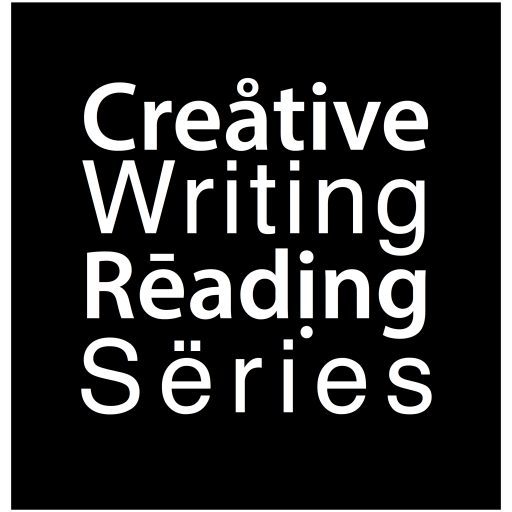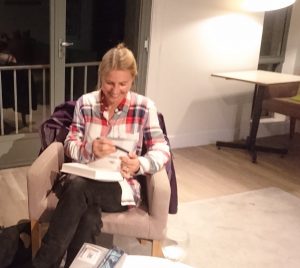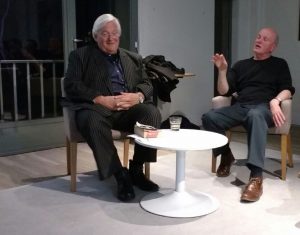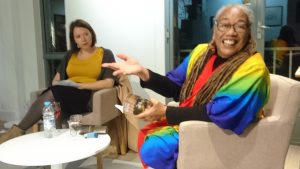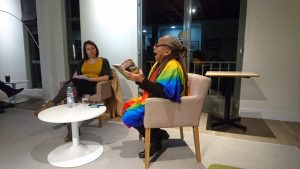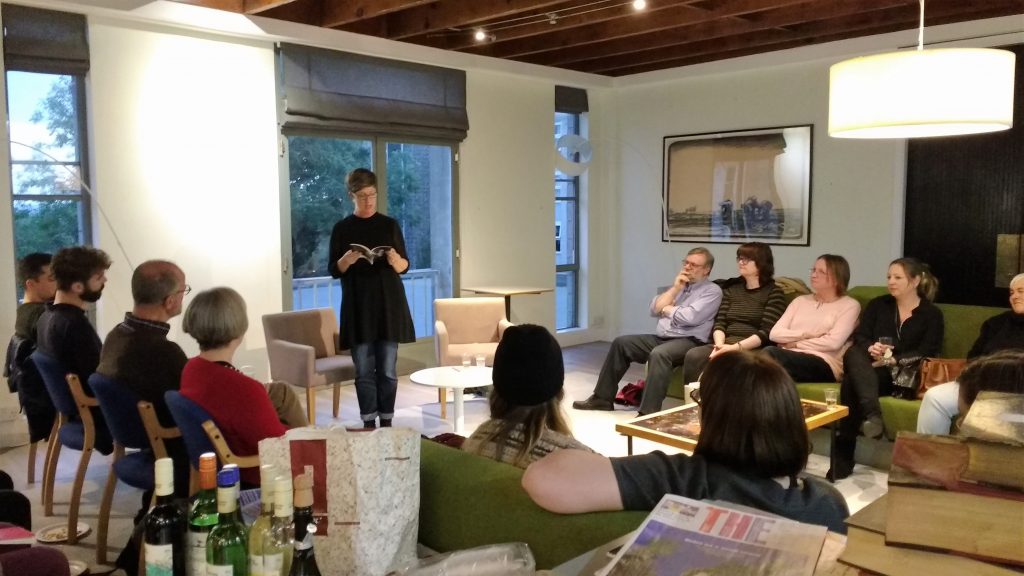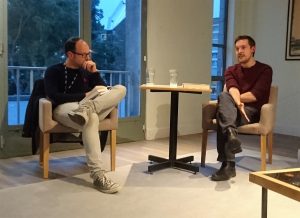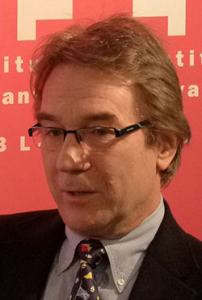
Tony Fraser is the editor and publisher of the poetry journal Shearsman, and of Shearsman Books, and has been since the founding of both in the early 1980s. It’s a big press — they publish poets from around the world, in chapbooks and full collections, as well as books of essays and criticism, and some reprints of classic works of literature.
As ever in the summer term, the evening started with readings from four postgraduate writers — all poets this time! Nigel Cox read two poems from a collection called ‘Ash’ that came out of the Writing & The Environment module on the Creative Writing MA, Setareh Ebrahimi read a poem from a sequence she’s been working on about mothers inspired by Sharon Olds, Duncan MacKay read a snippet from his ‘Happenstance Journals’, and Moyra Tourlamain read a piece taken from her PhD on the end times.
Tony started off by telling us about how the publishing process work at Shearsman. He says that it depends very much on each project how long it can take — some books will take a matter of days to put out, whereas some can take six months or more. He tends to publish fifty titles or so a year, although some were held back from last year due to no fault of his own, and have put this year’s numbers slightly out of whack. He tries to respond to writers who submit to him within three months of receiving their submission, and he goes through phases where the press is open and closed to submissions in order to manage the numbers. “Make sure to read guidelines!” he says to writers who are thinking about submitting their work.
For the most part he edits the magazine himself, alongside the press, but Kelvin Corcoran edits some issues.
He urges writers to understand markets thoroughly before they start to send their work out on submission. “You wouldn’t send a bodice-ripper to Gollancz, and you wouldn’t send a sci-fi blockbuster to Mills & Boon.” Read books from the presses first to get a good sense of what they like, what they’re interested in. All of this will help writers to send their work to the right place. On Shearsman’s website, there are previews of almost every title that’s available to buy, and at the very least he urges poets who submit to him to click through a fair number of these. Arbitrarily pick a random selection to get a stronger overview. If you don’t like any of them, maybe it’s not the right press for you.
Magazines are a good place for poets to test their work, before they publish a full collection. He recommends poets go to the Poetry Library in London and browse the large selection of magazines there to work out where they should send their poems — where they’d like to be, who they’d like to be published alongside.
They’re also a good way for writers to build up name recognition, and a readership. Tony says that there’s not much he can do to market poetry books — he sends them out for review, and hopes the poet can book some good readings. Poetry Review has a circulation of about 3,000 people, and in the past he’s bought adverts in it. It doesn’t work — he doesn’t sell any more copies than he would otherwise. He has an email newsletter which he says does work. It helps him sell books. But anything physical costs more than it makes back. He organises launches at Swedenborg House in London, and goes to a few good book fairs in London (Free Verse), Leicester (States of Independence)… people come to book fairs, and they buy books there. Shearsman’s bestseller is an anthology that’s sold around 1300 copies, and their worst-seller has sold only around 23 copies. For poetry in general, he’s quite happy if he sells over 100 copies. Shearsman uses POD to print in small quantities, which makes these numbers viable.
Nancy asked if he likes to get involved in the editorial side — specifically, working with the poets on their poetry. He says that he’s not a poet, and so he sometimes uses Kelvin as a sounding board for his suggestions before he sends them to the poet, and that sometimes he gets Kelvin to work with poets directly — especially if they’re new writers. So he tries to work with writers as they need it. He says that sometimes he has met with resistance on editorial work from writers — that sometimes they just envisage a different shape for a project from each other and they can’t resolve that, and so then the writer takes the book elsewhere.
Tony tells us that Nancy’s book, Continental Drift, took about a year to finish editing and to publish. He likes this — he doesn’t like to arrange things to publish a book too quickly, to rush it out before it’s ready. But he also doesn’t like to line things up too far in advance — he tries not to be tied in for something more than 18 months in advance if he can help it.
Some of the recent books that Tony’s most excited about are: the first book by a poet called Erica McAlpine, The Country Gambler, which is mostly made up of sapphics and which he says was perfect when it came to him as a manuscript; and David Hadbawnik’s translation of The Aeneid, Books I – VI, which he described as an insane translation of Virgil, very weird, post-Black Mountain. It gets weirder as it goes on — “book 6 is completely wild, free-form”. Shearsman allows Tony to publish books that excite him, that don’t necessarily have much else in common, as these both demonstrate — and these books allow the press to remain exciting and interesting, too.
